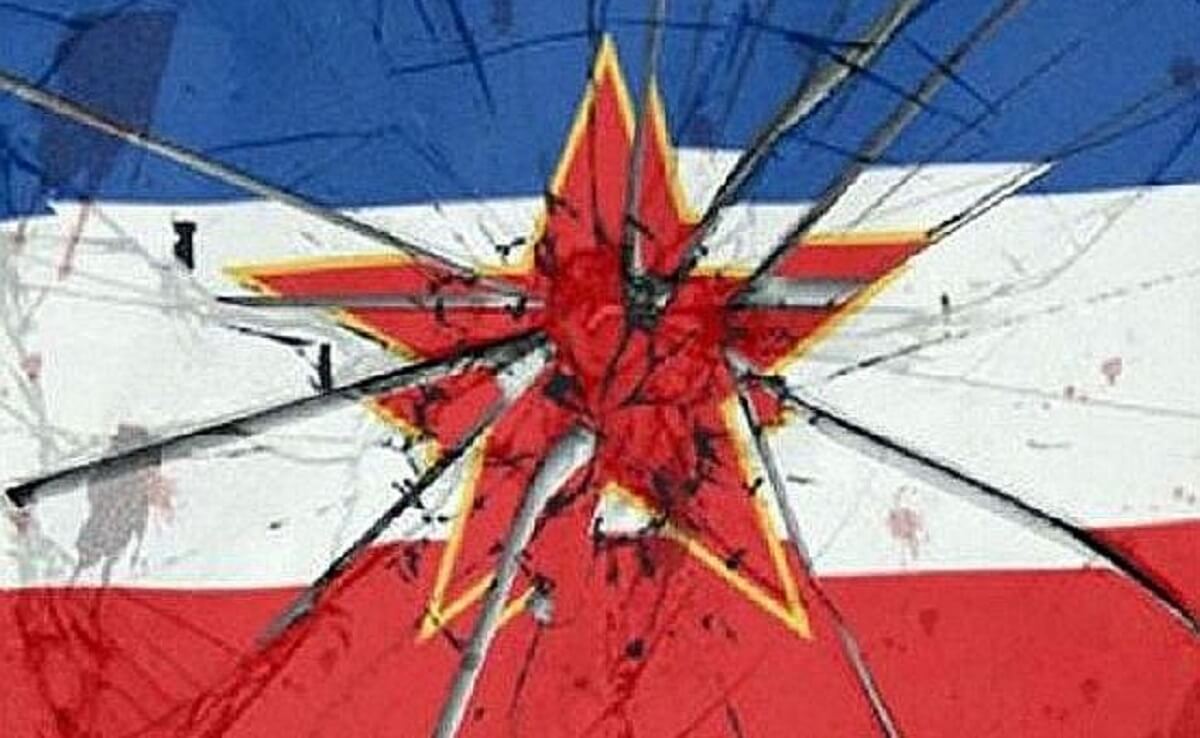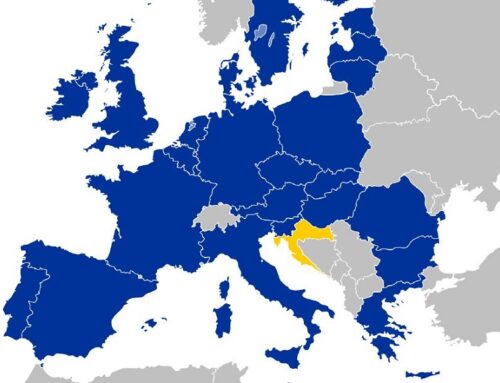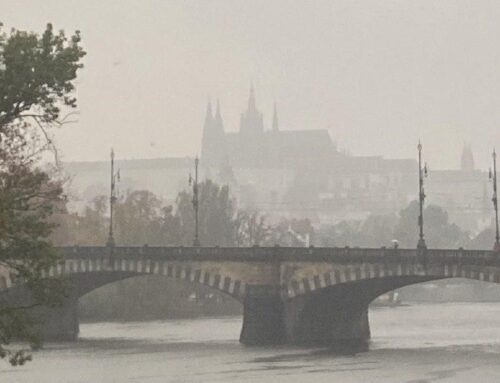Elma Demirović
Introduction
I will begin my paper by explaining why I chose the topic “Religious nationalism: the case of former Yugoslavia” and what will be the purpose of this paper. The role of religion is significant in many aspects, and it shapes and affects human lives in many ways. The last few decades the rise of religion as a political force has become a global trend that still is not recognized enough, but it certainly has a major impact on transformation of world politics today. The purpose of this paper is to answer the following question: “What is religious nationalism? Discuss from the perspective of both theory and practice in the former Yugoslavia”. In the first part of the essay I will explain de-secularization theory, and in the second,I will focus more on the complex relationship between religion and nationalism in the former Yugoslav states, and explain the ways in which religion and religious institutions impact on nationalist regimes in former Yugoslav states and vice versa. Both membership or belonging to the religious community and membership or belonging in the political community in the successor states, as I will show in this paper, have been intertwined with ethnic belonging. I argue that religion had a crucial role in shaping identities of post-Yugoslav political communities and influenced nationalist political motives and decisions.
(De)secularization theory or the ‘revival’ of religion
Before I touch upon the concept of religious nationalism, I will explain the theory of secularization and the opposite theory of de-secularization to show what has caused the revival of religion in the political arena in recent years.
Peter Berger, a sociologist and theologian, who presented his perspective on the theory of secularization in his first book, argued that secularization (originally meant the removal of land from religious authority) will be the dominant theory in society due to the process of modernization and that the role of religion will decrease.[1]However, Berger himself has changed his view as time went on, and realized that religion was, and still is, and probably will be, an important feature in people’s lives, and that it will experience resurgences in various forms in the world.[2] He argues that the world today is for the most part more religious than it ever was. The idea that modernization leads to a decline of religion proved to be wrong. In his view, modernization has provoked powerful counter-movements or de-secularization, especially at the level of individuals. Some religious people defined modernity as the enemy, others thought that religious beliefs and practices should adapt to modernity. Both the rejection and adaptation are ways of perceiving secularization in the world. According to Berger, modernity undermines tradition and the old certainties, and consequently any movement that promises to provide certainty to people has advantage.[3] In most countries religious upsurges have a strong populist character. There are situations when religion is used as a convenient legitimation for political agendas based on non-religious interests, such is causing wars, and Berger argues that Bosnian conflict, commonly represented as a clash between religions, is not really inspired by religious ideas.[4]
In assessing the influence or connection of religion in/with politics, Berger argues that the wars of the future will be predominantly ideological ones, (including nationalism as the ideology of one nation) and that religion will play a significant role in them.[5] William Cavanaugh argues that religion has a tendency to promote violence and it is impossible to separate religious from economic and political motives, and to claim that religious motives are innocent of violence.[6] Charles Kimball well said:
“It is somewhat trite, but nevertheless sadly true, to say that more wars have been waged, more people killed, and these days more evil perpetrated in the name of religion than by any other institutional force in human history.”[7]
Historian Martin Marty argues that religion has a particular tendency to be divisive and therefore violent,and he listed common features of religion and politics to show how closely are intertwined. Mark Juergensmeyeragrees by saying that ferocity of religious nationalism comes from the very special relationship of religion and violence. William Miles speaks about para-theology or the conceptualization of the illegitimate use of religion for political motives and purposes, what he calls ‘sacralized politics’.[8] Miles argues that political para-theologians use the religion to influence their followers, citizens, to commit (anti)religious behavior in order to gain political power to fulfill their own motives and interests.[9]
Religious identity must be separated from ethnic identity because then we cannot distinguish religious from ethnic conflict. Danger of such confusion is that conflict resolution and reconciliation will be seriously compromised, such as in the case of Bosnia and Herzegovina (hereafter BiH).[10] Religion is far from having a pacifying effect.Overall, theorists can agree on one thing – religious nationalism is a particular type of nationalism. I will conclude this part by referring to Rogers Brubaker’s understanding of this concept:
„Nationalism and religion are often deeply intertwined. Political actors may make claims both in the name of the nation and in the name of God. Nationalist politics can accommodate the claims of religion, and nationalist rhetoric often deploys religious language, imagery and symbolism. Similarly, religion can accommodate the claims of the nation-state, and religious movements can deploy nationalist language“.[11]
The case of former Yugoslavia
I will dedicate this part of the essay to a concrete example of religious nationalism in the former Yugoslav states (mainly focusing on BiH), where nationalist strategies are legitimized in religious terms and vice versa.
The revival of religion in political sphere in Yugoslavia started in the middle 1980s, with the rising of nationalist ideologies, which tried to resolve the question of national identity as prime political concern at the time. Religion and religious institutions were essential in shaping or constructing people’s national identity. Nowadays, in the former Yugoslav states the relation, as well as the tension between religion and politics shows in the concept of political membership, which is defined by ethnicity, mostly expressed through religious symbols embedded in the state’s symbols.[12]Yugoslavia was the area historically structured as a meeting point, and I would also say,a fusion of three major monotheistic religions: Catholicism, Orthodox Christianity and Islam. Today these religions serve as a main ‘tool’ in shaping political decisions. The dominant political trends in the former Yugoslav states are the so-called religionization of politics and the politicization of religion.[13] Socio-political process whereby religious actors are becoming more engaged in public debates and political processes is called the politicization of religion. Religionizationof politics is the process when religious languages, identities, practices and symbols are becoming more politically dominant and publicly pervasive.[14] The case of the former Yugoslav states is evidence of both processes where never before have religious actors had as great capacity for political influence as today.
Glorification of people’s ethnic belonging by religious institutions, which is named ethnophyletism by Vjekoslav Perica[15], had a significant impact on the political communities. Ethnophyletism represents the„ethnification of the sacred“, and that is why religion is such powerful agent for constructing national identity.[16] Perica argues that the national churches have become “hallmarks of nationhood”, which key element is the idea of ethnically based nationhood and national churches that are entitled to national leadership, however never accountable, nor culpable for political blunders as state leaders.[17] Since the ethno-religious narratives are essential for nation-building processes, historically glorification and victimization have become a part of those narratives in the former Yugoslav states. All three religions see themselves as the frontier religions and they act as such – Croatian Catholic church as antemurale christianitatis, Serbian Orthodox Church as the guardian of the Eastern borders from the West, and Bosnian Muslims as the only heir of Ottoman Empire, encircled by hostile states and nations. Redrawing the map to stop the war, in other terms –‘sacred re-territorialization’, made Catholics, Orthodox and Muslims to live their lives territorially and culturally moredistant than ever before, resulted in the growth of intolerance and hatred.[18]
Serbian Orthodox Church was the major opponent of the independence of Montenegro and Kosovo, serving as a good example of how membership in the church defines national identity. Serbian nationalism relies on Kosovo myth, and when Kosovo declared its independence in 2008, Serbian Orthodox Church was the most important actor who placed pressure on state institutions, politicians and public for the preservation of Kosovo’s territory. Signing agreement between Serbia and Kosovo in 2013 the Church saw as a betrayal.[19] The problem of Bosnian Muslimsis that they have no myths of their own, nor the native land – so, they were unequal partners in the religious-nationalist competition in Yugoslavia.[20] The Islamic Community became for Bosnian Muslims in Abazović’s words a „surrogate of national community“[21] until the 1990s when political parties have, representing their interests, emerged. The name ‘Bosniak’ was officially introduced in 1993 to determine a political and national group. In that way religion and religious narratives were used for political purposes. Today the question of being ‘Bosnian’ or ‘Bosniak’ became a matter of public debates, where many citizens of BiH resent ethno-religious categories and would rather declare themselves as only Bosnians to reaffirm their loyalty to the state.[22]
Manipulation of religion in the hands of nationalists undermines democratic pluralism in BiH, and poses a serious threat to peace and stability, and interethnic coexistence.There was also a religious effort to recover its role in contemporary transitional period in these states – some kind of reconquista of their societies through their re-catholization, re-orthodoxization and re-islamization in/through state politics.[23] Abazović argues that today the major consequence of the conflict is evident – the prospects of the establishing a democracy and cooperation firstly through reconciliation by pleading guilty by all sides seems further away that in the late 1990s.[24] In the case of BiH, each of religious actorspresents their own group as the main victim of war, and neglects to discuss the issue of accountability and guilt of the responsible parties within their group, which today is the cause of many problems and disruption of peace in the country. There is consensus among the Orthodox clergy on the issue of culpability for the war,as they reject the idea that Serbia has a responsibility for the outbreak of war, and for genocide.[25] Abazović emphasizes the problem of transitional justice, where the vast majority of population also „suffers from a deficit of truth and factual knowledge“, that hinders the whole processes of reconciliation.[26]
In addition, I argue that the main reason why the process is so problematic in practice is that it is imposed by external actors. It does not come sincerely from the state’s authorities, who actually want to overcome the past and turn to the future, but ‘by force’ to fulfill the obligations imposed on these states by Western organizations in order to join them in the future. The underlining paradox is that the institutional framework of BiH, established through Dayton Peace Accords, does not promote ethno-religious cooperation, rather it legitimates ethnic discrimination based on religion.[27] An important part of why reconciliation efforts are not achievable is due to a lack of alignment of priorities, especially setting political and economic priorities above ethnic priorities.
The way reconciliation efforts can be achieved is by focusing on the future of the country and improving the relations between ethnic groups and thus addressing issues caused by nationalist division and secure coexistence in the respecting country.[28] The whole society must confront the past and not in the sense of victim-blaming, but enable the citizens to objectively distinguish between right and wrong, just and unjust. In that respect, the future of BiHlies in reconstitution of the state as a political community, not as ethno-religious communities. Abazović believes that the possible solution we can find in everyday life of citizens and in striving to normality of life – not so much in engaging in interethnic reconciliation as their prime concern, rather in establishing „economic security and neighborhood sociality“.[29]
Conclusion
This short paper aimed to discussreligious nationalism from the perspective of theory and practice in the case of former Yugoslavia. The paper showed us how socially and politically destructive the variable interplay between religion and politics can be, especially in the former Yugoslav states.It seems that religion and religious institutions, corrupted by nationalism, anti-secularism, fundamentalism, ethno-clericalism and other ‘isms’, combined with the unwillingness and inability of political leaders, pose a great obstacle to a more efficient and more genuine transition to stabilization and democracy in these states. The future can only be guaranteed by rejecting the unreconciled narratives of victimization and obssesions with the mythically interpreted past – by separating religious communities from nationalist politics and by desacralizing politics.
Bibliography
Articles
Aleksov, Bojan. „Questioning Western Approaches to Religion in the Former Yugoslavia“, Balkanologie, vol. 15, no. 1 (2020).
Brubaker, Rogers. „Religion and nationalism: four approaches“, Nations and Nationalism, vol. 18, no. 1 (2011): 2–20.
Miles, William F. S. “Political para-theology: rethinking religion, politics and democracy”. Third world. Quarterly (September 1996): 525–535.
Oddie, Morgan. „The Relationship of Religion and the Ethnic Nationalism in Bosnia-Herzegovina“, Occasional Papers on Religion in Eastern Europe, vol.32, no. 1 (2012): 34–42.
Radović, Milja. „Citizenship and Religion in the Post-Yugoslav States“, CITSEE Working Paper Series, 35 (2013): 1–22.
Reaves, Dylan. „Peter Berger and the Rise and Fall of the Theory of Secularization“, Denison Journal of Religion, vol. 11, no. 3 (2012): 10–19.
Vrcan, Srđan. “Faith and State: the exemplary case of former Yugoslavia”, Transeuropeennes, Religions in Politics, no. 23 (2003): 51–63.
Books
Abazović, Dino. „Reconciliation, Ethnopolitics and Religion in Bosnia-Herzegovina“, in Abazović, Dino and Mitja Velikonja (eds.), 35–57. „Post-Yugoslavia: New Cultural and Political Perspectives“. New York: Palgrave Macmillan, 2014
Berger, Peter. “The Desecularization of the World: A Global Overview”, in Berger, Peter L. et al. (eds). “Resurgent Religion and World Politics”. Washington: Wm. B. Eerdmans Publishing Company, 1999.
Perica, Vjekoslav. „Balkan Idols: Religion and Nationalism in Yugoslav States“. Oxford: Oxford University Press, 2002.
Lecture
Cavanaugh, William. “Does Religion Cause Violence?” Held at the University of Western Australia, 29th May 2006, 1–21.
Reference:
[1] Berger, Peter. “The Desecularization of the World: A Global Overview”, in Berger, Peter L. et al. (eds). “Resurgent Religion and World Politics”. Washington: Wm. B. Eerdmans Publishing Company, 1999.
[2] Reaves, Dylan. „Peter Berger and the Rise and Fall of the Theory of Secularization“, Denison Journal of Religion, vol. 11, no. 3 (2012): 10–19.
[3]Berger, The Desecularization of the World: A Global Overview.
[4]Ibid.
[5]Reaves, Peter Berger and the Rise and Fall of the Theory of Secularization, 13.
[6] Cavanaugh, William. “Does Religion Cause Violence?” Held at the University of Western Australia, 29th May 2006, 1–21.
[7]Ibid., 3.
[8]Miles, William F. S. “Political para-theology: rethinking religion, politics and democracy”. Third world. Quarterly (September 1996): 525–535.
[9] Ibid., 532.
[10]Miles,Political para-theology: rethinking religion, politics and democracy, 533.
[11]Brubaker, Rogers. „Religion and nationalism: four approaches“, Nations and Nationalism, vol. 18, no. 1 (2011): 2–20., 16.
[12]Radović, Milja. „Citizenship and Religion in the Post-Yugoslav States“, CITSEE Working Paper Series, 35 (2013): 1–22.
[13] Vrcan, Srđan. “Faith and State: the exemplary case of former Yugoslavia”, Transeuropeennes, Religions in Politics, no. 23 (2003): 51–63.
[14]Aleksov, Bojan. „Questioning Western Approaches to Religion in the Former Yugoslavia“, Balkanologie, vol. 15, no. 1 (2020).
[15] Perica, Vjekoslav. „Balkan Idols: Religion and Nationalism in Yugoslav States“. Oxford: Oxford University Press, 2002.
[16] Ibid., 68.
[17]Ibid., 215.
[18]Vrcan,“Faith and State: the exemplary case of former Yugoslavia”, 57.
[19]Radović,„Citizenship and Religion in the Post-Yugoslav States“, 16.
[20]Perica, „Balkan Idols: Religion and Nationalism in Yugoslav States“.
[21]Abazović, Dino. „Reconciliation, Ethnopolitics and Religion in Bosnia-Herzegovina“, in Abazović, Dino and Mitja Velikonja (eds.), 35–57. „Post-Yugoslavia: New Cultural and Political Perspectives“. New York: Palgrave Macmillan, 2014.
[22]Radović,„Citizenship and Religion in the Post-Yugoslav States“, 17.
[23]Vrcan,“Faith and State: the exemplary case of former Yugoslavia”, 58.
[24] Abazović, „Reconciliation, Ethnopolitics and Religion in Bosnia-Herzegovina“, 43.
[25]Oddie, Morgan. „The Relationship of Religion and the Ethnic Nationalism in Bosnia-Herzegovina“, Occasional Papers on Religion in Eastern Europe, vol.32, no. 1 (2012): 34–42.
[26]Abazović, „Reconciliation, Ethnopolitics and Religion in Bosnia-Herzegovina“, 41.
[27]Ibid., 43.
[28]Oddie,„The Relationship of Religion and the Ethnic Nationalism in Bosnia-Herzegovina“, 38.
[29]Abazović, „Reconciliation, Ethnopolitics and Religion in Bosnia-Herzegovina“, 46.





